Magento vs Shopify vs BigCommerce - 7 Factors to Consider

Magento. Shopify. BigCommerce. Which is the best choice for your online store?
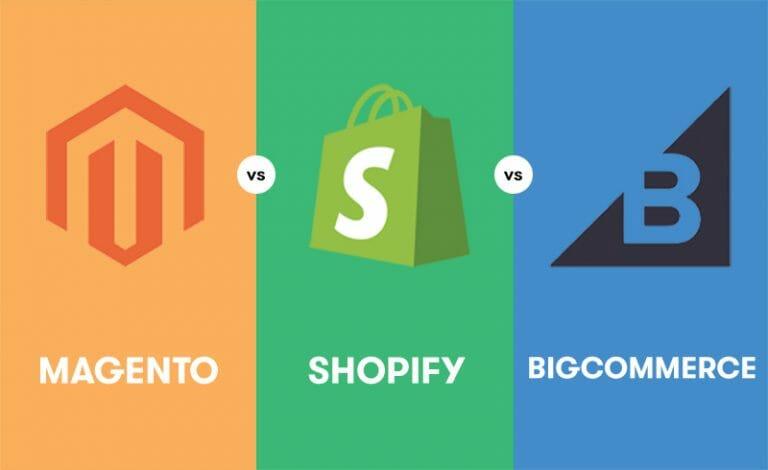
Selecting a shopping platform is the foundation of an ecommerce business’ operation. Most of the leading platforms are industry agnostic, and all of them competently provide core shopping cart, payment, shipping, and store management features.
Yet, as with any choice, the larger the number of options available, the more nuanced the best decision becomes for a particular business’ needs. For this reason, we have constructed this guide, and encourage you to contact us, or other ecommerce professionals, to help you make the best decision for your specific business, after consulting about these nuanced differences.
Endertech’s ecommerce developers compiled the following overview of 7 factors to consider when deciding between Shopify technology, BigCommerce SaaS platform, and the leading open source ecommerce platform, Magento.
With more than a decade’s experience developing successful online storefronts and operations for clients across a broad spectrum of industries, here are Endertech’s insights into factors, features, functionality, and costs to consider in your selection process.
1. Platform Costs
Shopify and BigCommerce require a perpetual monthly fee, but embedded within is the cost of hosting as well as general evolutionary platform upgrades. Shopify and BigCommerce both offer tiered pricing based on monthly sales volume at quite similar price points for small to midsize operations. For larger volumes, BigCommerce has a lower monthly cost than Shopify. All three platforms charge in the $2,000 neighborhood per month for their enterprise solutions:
In lieu of the mandatory and scaling monthly fees, required by Shopify and BigCommerce, Magento website owners have to pay only for hosting at a minimum, but should consider also engaging a development partner to help keep the Magento platform up to date with the latest versions and patches released by the community. Such fees are generally flat, monthly.
Shopify:
Basic | Standard | Plus (“Advanced”) | Enterprise |
$29/mo. | $79/mo. | $299/mo. | $2,000/mo. |
Highest payment processing fees of 2.9% + 30¢ fee per transaction. Designed for small businesses with revenue <$50K/year | Slightly lower 2.5% + 30¢ fee per transaction. Includes additional features: reports and gift card capabilities | Slightly lower 2.4% + 30¢ fee per transaction. Consider Plus if your shop’s revenue >$300K/year | Designed for large operations. Allows for operating a wholesale B2B channel, branded checkout, customer support, automation |
BigCommerce:
Basic | Plus | Pro | Enterprise |
$30/mo. | $80/mo. | $250/mo. | From $1,200/mo. |
Highest payment processing fees – 2.9% of sale + $0.30 per transaction. For small businesses with revenue <$50K/year | Slightly lower fees of 2.5% + $0.30 per transaction. For businesses with less than $125K in annual salesMore features like CC vaulting | Fees of 2.2% + $0.30 per transaction. For <$600K in annual sales. Increases $150 per $200K annual revenue | For large sales volumes, B2B, and comes with much more robust customer support. Subscription pricing is based on annualized order volume. |
Magento 2:
Open Source | Commerce (Enterprise) |
Free * | $2,000/mo*$4,000/mo. (cloud hosting included) |
No per transaction fee levied by Magento; only by the payment processing partner chosen. Hosting and maintenance costs are separate cost line items, and are flat relative to revenue, removing calculation headaches tiered to revenue as charged by the SaaS platforms | Enterprise option is suited for larger corporations and comes with robust customer support |
Initial development costs: Dependent on the complexity of the store desired. Out of the box development on all three ecommerce platforms can be similarly simple if all the product data and commerce configuration information is readily at hand. Shopify and BigCommerce are structured to service conventional ecommerce features. Magento is capable of being customized to service virtually any ecommerce scenario envisioned.
2. Product Pricing Capabilities
The art of ecommerce involves intricate pricing strategies. Each platform allows for basic strategies like sales pricing, discount pricing, BOGO offers, free shipping offers, etc.

Magento excels at offering a variety of pricing variants such as sales, wholesale, and designated customer group discounts. A broad roster of extensions (add-ons), which may carry a one time fee, augment its core capabilities for special scenarios such as flash (very short duration) pricing, specific customer negotiated pricing, or ability to mask pricing other than to enrolled subscribers. Add-on plugins involve a one-time cost to acquire plus some invested web development time to integrate.
The basic core Magento installation is able to produce multiple website viewing options, each website version possessing the ability to display different pricing for the same product/catalog.
BigCommerce and Shopify offer these advanced pricing functionalities only in their Pro/Plus and Enterprise levels, often by way of adding external plug-in applications, many of which carry a recurring monthly fee above and beyond the core platform’s monthly fee.
Magento is a shopping platform solution you own, and can viewed as a real asset for your business with a balance sheet presence. SaaS platforms are lease arrangements, so there is no recognized financial ownership of the platform.
3. Back-Office Integration
Back-office integration references the platform’s ability to integrate with back-office accounting, purchasing and inventory systems. All three platforms work well with the standard offerings from providers like Quickbooks, CounterPoint and Fishbowl using extensions from a variety of providers like Mag Manager, Mage Plaza, etc.
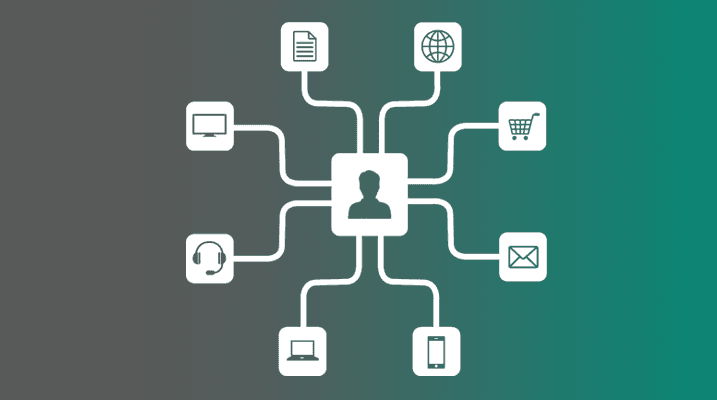
Magento is the most likely to be accommodating toward the more custom, obscure, or industry specific back-office solutions, as its source code can be customized to connect with a myriad of exotic backend softwares, but such integrations will typically involve some additive custom development expense. Magento can also be customized to read order data and add in inventory or products from any niche back-office system.
The Shopify and BigCommerce ecosystems have some supplemental back office services at a additional monthly fee. For example, BrightPearl is a large ERP and back-office provider offering integration with both Shopify and BigCommerce for order management, product purchase replenishment, financial management, and warehousing inventory management.
SellBrite is another popular multi-channel listing app that integrates with BigCommerce and Shopify. Magento offers the most flexibility. Among the SaaS offerings, BigCommerce Enterprise integrates with 13 established ERP platforms; a more robust back-office integration offering than Shopify Plus.
If making a choice to go with a SaaS platform, make sure back-office operations are not likely to have unusual needs that go beyond the restrictive SaaS options, especially given the expense already invested in a firm’s ERP.
4. Customization Options
Magento, as an open source solution, provides more options for customization of added features and functionality. The Magento community continues to expand and improve the feature set offerings. The upfront development costs will increase with the amount of customization desired.
It should be noted that currently, a transition is underway away from Magento 1 (with a support sunset deadline of June 2020) to the new Magento 2 architecture, necessitating a comprehensive platform upgrade for existing Magento 1 clients. Such a major platform upgrade with its associated costs presumably can be anticipated to happen about once a decade
.5. Payment Gateways
Magento, Shopify and BigCommerce work with most of the major payment gateways (such as QuickBooks, PayPal, Authorize.net, Stripe, Amazon Pay, World Pay, Samsung Pay, Apple Pay, Google Pay, etc.).

Magento can customize access for any payment gateway not already serviced by an existing extension in the marketplace.
Shopify integrates with many of the popular payment gateways, and has a pricing bias towards its own Shopify Pay. However, as Shopify Pay will not service some verticals (such as pharma, adult, cannabis, alcohol, gambling, weapons, etc.). Clients in those industries must use one of the other external payment gateways, enduring the additional percentage fee that Shopify levies when using another provider other than Shopify Pay.
BigCommerce does not tack on additional fees for using a different payment gateway as Shopify does.
6. Shipping Services
All three platforms handle simple shipping well with their out of the box configurations. The three integrate with all major standard shipping service providers like UPS, USPS, DHL Express, Fedex.
For more complicated shipping configurations, services like ShipStation offer more in-depth shipping management to leverage unique omnichannel setups. This is typically for larger scale business who handle hundreds of shipments per day.
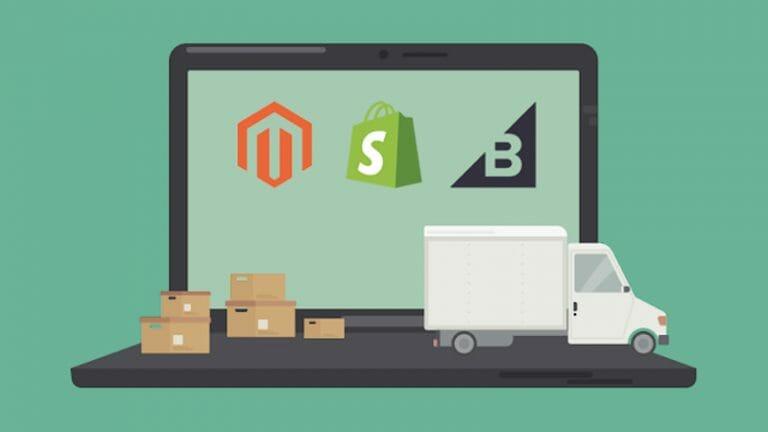
Some businesses have unique shipping rules like a use of a courier service (different from a carrier service,) adding 15% to UPS shipping costs, as well as specific shipping restrictions based on weight / destination / shape.
Custom rates can be loaded into each of the three systems based on geographic destination, zip-code, and product weights. These systems also allow for restricting designated shipping options based on destination or attributes of products in the shopping cart. Free shipping offered for orders over a specified dollar amount is a standard feature across all three platforms, and has become a compelling feature in enticing customers to make their purchase at an ecommerce store.
7. Sales Tax
All three platforms are adept at updating to account for changes to sales tax laws, which often happen at state and county levels.
Integration with tax software that automates tax calculation (TaxJar, Avalara, Vertex) are popular due to the increasingly complex nature of internet sales tax. BigCommerce comes already integrated with Avalara, which automates the complex tax laws based on a customer’s shipping address.
For international ecommerce, Magento excels at designating tax class definitions if tax needs to be charged for the transaction based on product, weight, and destination (including European VAT). Tax classes can be assigned to shipping, products and customers, as different regions apply taxes to varying baskets of categories.
8. Catalog Management
All three platforms can theoretically handle any size catalogue, however Shopify is capped at 100 variant combinations per complex product and only three discrete variant options – such as size, color, and sleeve length. BigCommerce is more flexible and can handle up to 600 variants, while Magento is the only option that offers truly unlimited scope for the size and varietal mix of a merchant’s product catalogue. Magento supports complex product types, including grouping and bundling designated products.
Configurable – aspects of a product like size, color, material can be configured as varietals of the core product
Simple – each product version has a unique SKU and price
Magento offers grouping and bundling of products, to package together multiple simple products to create a bundle that can be clustered and sold at a fixed or dynamically generated price.
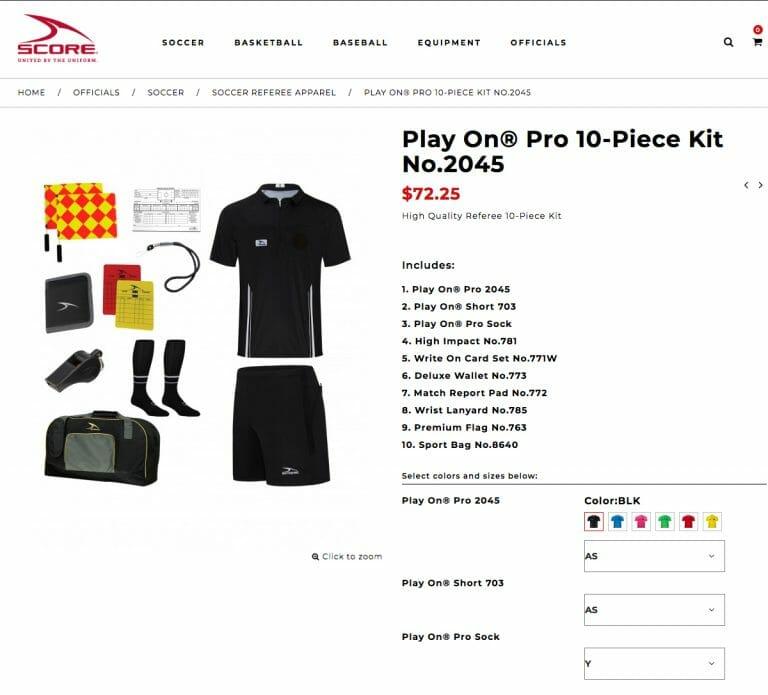
Magento’s approach to catalog management enables a merchant to present products on their website in a variety of manners. A product can be presented as a singular static product, or as a product which can be configured by options the shopper selects, such as size, color, material, sleeve length, etc. Catalog management options also include the bundling together of multiple products allowing a merchant to package various product SKUs into a grouped offering, such as for a gift basket or a uniform consisting of multiple pieces. Grouped products enable customers to quickly add many products to the cart simultaneously.
Product Attributes are another key aspect of identifying and describing products as Magento allows for searching based on attributes. These can be grouped into attribute sets, which also is key to structuring a product catalog with well defined classifications. Different stores within the same database system can stem from different root categories offering different product catalogs and Magento also offers a ‘visibility’ tuning feature to control the how, when, and were any product can appear in any particular store.
BigCommerce can handle up to 600 variants for any product, and Shopify can handle up to 100 variants for any product.
8b. B2B and Wholesale
Magento’s core structure includes features that are important for B2B such as the ability to vary prices for specific customer groups; and the ability to display two different websites from the same Magento administration. The open source version can be expanded to fulfill many B2B business needs using pre-built extensions enabling customer specific pricing, request a quote functionality, custom catalogs per customer, multi-source inventory, dropship fulfillment, etc. through customizations that a website development agency like Endertech can undertake.
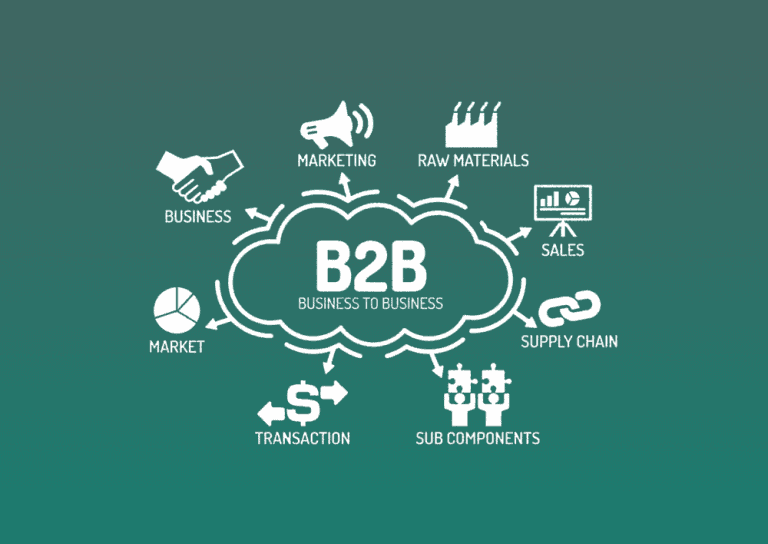
Magento Enterprise comes with B2B modules included for offering catalogs customized per customer (custom store experience, pricing, sales data reporting), staggered user access permissions (by team, role, task responsibility, status, geo) and an expansive content management system.
Shopify only handles B2B functionality via its Enterprise offering, which includes task automation and the ability for store activities to trigger response actions.
BigCommerce – offers B2B pricing features on Plus subscriptions and above. This allows for creating customer groups with special negotiated prices, tied to your customer’s user account (this means they have to be signed in, in order to see the price differences). These special prices can be tuned to any detail of your product catalog; meaning that you can place the discounts according to certain categories, SKUs, etc.
8c. Multiple Store Fronts (Brands)
For merchants who wish to present distinct store fronts for a collection of in-house brands, Magento offers the easiest pathway toward setting them up as individually branded web-stores with separate orders, items, and inventory data, all sourced from one single database installation. The multiple website mode allows Magento to sell the same product in different prices on each site, on completely different domain names with different payment types and distinct shopping carts. There is also a multiple store view approach (such as multilingual), which does not have as rigid a need for brand segregation, thus allowing for shared shopping carts in support of different product catalogs and different look/themes for each store.
Conclusion
Endertech is comfortable recommending all three Magento, Shopify, BigCommerce platforms reviewed here to our clients. More small ecommerce sites in the USA are built on Shopify than any other platform simply because of its user friendly interface and its integration of Amazon services. BigCommerce, while owning a much smaller share of the market, has been growing rapidly due to its similar offering to Shopify, albeit with slightly lower costs and additional offerings bundled into its core offering with no additional cost. Shopify and BigCommerce are considered to be Software as a Service (Saas), so their platforms are essentially closed and unable to support unique or custom back-end office infrastructures. SaaS platform advantages rest mostly with being slightly easier to operate for simple use cases (small catalogs, simple e-commerce functions) and can be setup without software developers, yet carry embedded leasing fees for the life of the business operating on those platforms.
Magento, on the other hand, has no recurring monthly fee, as you own the store once development is complete. Firms like Endertech can help you craft an ecommerce storefront using Magento that precisely matches your unique business operations. Enterprise size operations (>$5M in annual sales) generally need a custom solution and pricing, which is Magento’s strong suit, but can also be achieved with each of the three platforms studied here.
For businesses planning on working with a professional development partner, Endertech has helped many businesses choose the right ecommerce platform and harness them effectively for store design, content creation, marketing initiatives (including SEO), and of course, ecommerce functionality. To learn how we can help you maximize the productivity of your business’ shopping cart platform, call us on (310) 400-0800, or use our contact form.

